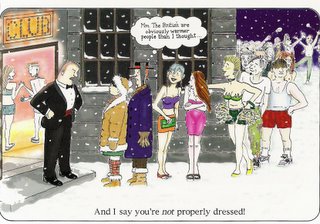Weathering the Differences
 In follow-up to my recent posting, A Contradiction in Terms, I've been doing a bit of research to try and get to the bottom of some of the confusing, contradictory and downright non-sensical things about England.
In follow-up to my recent posting, A Contradiction in Terms, I've been doing a bit of research to try and get to the bottom of some of the confusing, contradictory and downright non-sensical things about England.Similiar to how Jane Goodall might go about researching the behavior of chimpanzees in the wild, I've tried to be as scientific as possible, incorporating fieldwork (i.e. personal observation and inquiry) with established doctrine (i.e. literature written by or for British people.) In almost every instance, the latter manages to firmly substantiate my laypersons' point-of-view.
 For instance, from the hilariously tongue-in-cheek How to Be British comes this passage about the schizophrenic British sense of temperature control:
For instance, from the hilariously tongue-in-cheek How to Be British comes this passage about the schizophrenic British sense of temperature control:"It's 11:15 pm on a cold Friday night in the dead of winter. Two young women in midriff-baring crop-tops and mini-skirts with no tights underneath are strolling along arm in arm. This is an example of our famous British toughness. On the other hand, in summer, you may observe Brits sitting on the beach wearing jackets and pullovers with long woollen socks under their sandals. The important thing to remember is that the British dress to please themselves and to show their independence of fashion, weather, social convention and color theory."
Only the Brits could find a way to spin their bizarre, weather-inappropriate dress so that it's a reflection of an unfettered sense of independence.
 From Watching the English, I also learned (albeit too late to salvage many a social encounter), "The worst possible offense committed by foreigners, particularly Americans, is to belittle the English weather. When the summer temperature reaches the high 20's (low 70's Farenheit), and we moan, 'Phew, isn't it hot?', we do not take kindly to visiting Americans scoffing and saying 'Call this hot? This is nothing. You should come to [insert American city] if you want to see hot!'
From Watching the English, I also learned (albeit too late to salvage many a social encounter), "The worst possible offense committed by foreigners, particularly Americans, is to belittle the English weather. When the summer temperature reaches the high 20's (low 70's Farenheit), and we moan, 'Phew, isn't it hot?', we do not take kindly to visiting Americans scoffing and saying 'Call this hot? This is nothing. You should come to [insert American city] if you want to see hot!'Apparently, our comparisons represent "a grossly quantitative approach to weather" (if weather isn't quantitative, then what is?) but nonetheless, the English find this approach "coarse and distasteful". It seems they are very patriotic about their weather here, which I guess if you've got to grasp at straws to find something to band together on, will do in a pinch.








